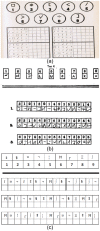Validity of the Symbol Digit Modalities Test as a cognition performance outcome measure for multiple sclerosis
- PMID: 28206827
- PMCID: PMC5405816
- DOI: 10.1177/1352458517690821
Validity of the Symbol Digit Modalities Test as a cognition performance outcome measure for multiple sclerosis
Abstract
Cognitive and motor performance measures are commonly employed in multiple sclerosis (MS) research, particularly when the purpose is to determine the efficacy of treatment. The increasing focus of new therapies on slowing progression or reversing neurological disability makes the utilization of sensitive, reproducible, and valid measures essential. Processing speed is a basic elemental cognitive function that likely influences downstream processes such as memory. The Multiple Sclerosis Outcome Assessments Consortium (MSOAC) includes representatives from advocacy organizations, Food and Drug Administration (FDA), European Medicines Agency (EMA), National Institute of Neurological Disorders and Stroke (NINDS), academic institutions, and industry partners along with persons living with MS. Among the MSOAC goals is acceptance and qualification by regulators of performance outcomes that are highly reliable and valid, practical, cost-effective, and meaningful to persons with MS. A critical step for these neuroperformance metrics is elucidation of clinically relevant benchmarks, well-defined degrees of disability, and gradients of change that are deemed clinically meaningful. This topical review provides an overview of research on one particular cognitive measure, the Symbol Digit Modalities Test (SDMT), recognized as being particularly sensitive to slowed processing of information that is commonly seen in MS. The research in MS clearly supports the reliability and validity of this test and recently has supported a responder definition of SDMT change approximating 4 points or 10% in magnitude.
Keywords: Multiple sclerosis; Symbol Digit Modalities Test; cognition; performance outcome; processing speed; psychometric validity.
Conflict of interest statement
Figures


Comment in
-
The measure tells the tale: Clinical outcome measures in multiple sclerosis.Mult Scler. 2017 Apr;23(5):626-627. doi: 10.1177/1352458517690825. Epub 2017 Feb 16. Mult Scler. 2017. PMID: 28206813 No abstract available.
References
-
- Charcot JM. Lectures on the Diseases of the Nervous System. London: New Sydenham Society, 1877.
-
- Rao SM, Leo GJ, St Aubin-Farbert P. Information processing speed in patients with multiple sclerosis. J Clin Exp Neuropsychol 1989; 11: 471–477. - PubMed
-
- Peyser JM, Rao SM, LaRocca NG, et al. Guidelines for neuropsychological research in multiple sclerosis. Arch Neurol 1990; 47: 94–97. - PubMed
-
- Rao SM, Leo GJ, Bernardin L, et al. Cognitive dysfunction in multiple sclerosis. I. Frequency, patterns, and prediction. Neurology 1991; 41: 685–691. - PubMed
-
- Gronwall DMA. Paced auditory serial addition task: A measure of recovery from concussion. Percept Mot Skills 1977; 44: 367–373. - PubMed
MeSH terms
LinkOut - more resources
Full Text Sources
Other Literature Sources
Medical
Research Materials

